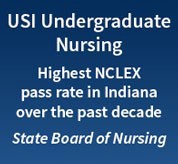 USI’s BSN program continues to maintain first-time NCLEX pass rates well above the national average of 80%. The high NCLEX first-time pass rate is a distinction that speaks to the quality of the students, the faculty and USI's Nursing Program.
USI’s BSN program continues to maintain first-time NCLEX pass rates well above the national average of 80%. The high NCLEX first-time pass rate is a distinction that speaks to the quality of the students, the faculty and USI's Nursing Program.
WE ARE SCREAMING EAGLES!
The University of Southern Indiana BSN graduate is prepared to:
The University of Southern Indiana MSN graduate is prepared to:
Upon completion of this program, the DNP graduate will be able to: